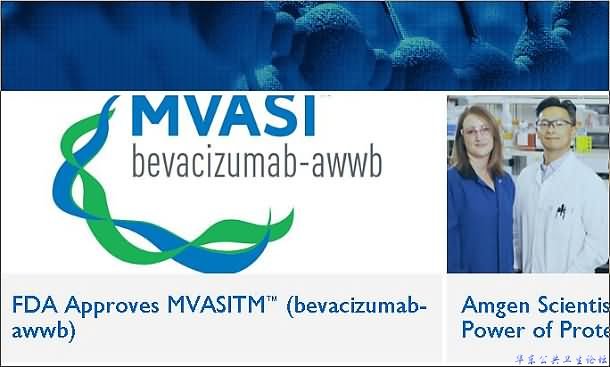美国食品和药物管理局(FDA)今天批准Mvasi(贝伐珠单抗bevacizumab-awwb)作为Avastin(贝伐单抗bevacizumab)的生物仿制药,用于治疗多种类型的癌症。 Mvasi是美国第一个批准用于治疗癌症的生物仿制药。
Mvasi(bevacizumab-awwb)是与Avastin(阿瓦斯汀单抗)生物相似的抗血管内皮生长因子A(抗VEGF)单克隆抗体,用于治疗多种类型的癌症,包括转移性结肠直肠癌,非小细胞肺癌,胶质母细胞瘤,转移性肾细胞癌和宫颈癌。
FDA专员Scott Gottlieb博士说:“为病人带来新的生物仿制药物,特别是对于现有治疗费用高的疾病来说,这是促进竞争的重要途径,可以降低医疗成本,增加获得重要疗法的机会。我们将继续努力,确保将生物仿制药物快速投入市场,确保这些新药符合FDA严格的黄金标准的安全性和有效性。
Mvasi被批准用于治疗某些结直肠,肺,脑,肾和子宫颈癌的成年患者。具体来说,批准的适应症包括:
转移性结肠直肠癌,与静脉注射基于5-氟尿嘧啶的化疗联合用于一线或二线治疗。 Mvasi未被指示用于手术切除的结肠直肠癌的辅助治疗。
转移性结肠直肠癌,与氟嘧啶 - 伊立替康或氟嘧啶 - 奥沙利铂联合化疗,用于二线治疗在一线贝伐珠单抗产品方案上进展的患者。 Mvasi未被指示用于手术切除的结肠直肠癌的辅助治疗。
非鳞状非小细胞肺癌,与卡铂和紫杉醇组合,用于一线治疗不可切除,局部晚期,复发或转移性疾病。
根据客观反应率的改善,先前治疗后的进行性疾病的成胶质细胞瘤。没有数据可以证明改善贝伐珠单抗产品的疾病相关症状或生存。
转移性肾细胞癌,与干扰素α组合使用。
与紫杉醇和顺铂或紫杉醇和拓扑替康组合的治疗持久的,复发或转移的子宫颈癌。
生物制品通常来自活体,可以来自许多来源,例如人,动物,微生物或酵母。生物仿制药是一种基于数据获得批准的生物制品,表明其与已批准的生物制品非常相似,在参考产品的安全性,纯度和效力(即安全性和有效性)方面没有任何临床意义上的差异,除了符合法律规定的其他标准。
FDA对Mvasi的批准是基于对包括广泛的结构和功能表征,动物研究数据,人体药代动力学和药效学数据,临床免疫原性数据和其他临床安全性和有效性数据的证据的审查,证明Mvasi与Avastin生物相似。它已被批准为生物仿制药,而不是可互换的产品。
Mvasi的常见预期副作用包括鼻出血(鼻出血),头痛,高血压(高血压),鼻腔炎症(鼻炎),尿中蛋白质含量高(蛋白尿),味觉改变,干性皮肤,直肠出血(出血),过度的泪液产生(流泪病),背部疼痛和皮肤刺激(剥脱性皮炎)。
Mvasi的严重预期副作用包括两个器官(穿孔或瘘管)之间的孔或异常连接,血块形成(动脉和静脉血栓栓塞事件),高血压,脑功能或结构中的问题(后可逆性脑病综合征),高水平蛋白质在尿中(蛋白尿),输液相关反应和卵巢功能丧失(卵巢功能衰竭)。如果这些副作用变得严重或危及生命,患者应停止使用Mvasi。怀孕的妇女不应服用Mvasi,因为它可能会伤害发育中的胎儿。
像Avastin一样,Mvasi的标签包含一个盒装警告,警告医护人员和患者胃肠和肠道孔的风险增加(胃肠穿孔);手术和伤口愈合并发症;和严重或致命的肺,胃肠道,中枢神经系统和阴道出血(出血)。如果胃肠穿孔发生,患者应停止使用Mvasi。选择性手术前28天,患者不宜服用Mvasi,直到外科伤口完全愈合。如果手术切口打开(伤口开裂),患者应停止使用Mvasi。 Mvasi不应给予严重出血的患者或咳嗽血液的患者(咯血)。
FDA批准Amgen公司的Mvasi.。Avastin于2004年2月获得批准,由Genentech公司制造。

The U.S. Food and Drug Administration today approved Mvasi (bevacizumab-awwb) as a biosimilar to Avastin (bevacizumab) for the treatment of multiple types of cancer. Mvasi is the first biosimilar approved in the U.S. for the treatment of cancer.
“Bringing new biosimilars to patients, especially for diseases where the cost of existing treatments can be high, is an important way to help spur competition that can lower healthcare costs and increase access to important therapies,” said FDA Commissioner Scott Gottlieb, M.D. “We’ll continue to work hard to ensure that biosimilar medications are brought to the market quickly, through a process that makes certain that these new medicines meet the FDA’s rigorous gold standard for safety and effectiveness.”
Mvasi is approved for the treatment of adult patients with certain colorectal, lung, brain, kidney and cervical cancers. Specifically, the approved indications include:
- Metastatic colorectal cancer, in combination with intravenous 5-fluorouracil-based chemotherapy for first- or second-line treatment. Mvasi is not indicated for the adjuvant treatment of surgically resected colorectal cancer.
- Metastatic colorectal cancer, in combination with fluoropyrimidine-irinotecan- or fluoropyrmidine-oxaliplatin-based chemotherapy for the second-line treatment of patients who have progressed on a first-line bevacizumab product-containing regimen. Mvasi is not indicated for the adjuvant treatment of surgically resected colorectal cancer.
- Non-squamous non-small cell lung cancer, in combination with carboplatin and paclitaxel for first line treatment of unresectable, locally advanced, recurrent or metastatic disease.
- Glioblastoma with progressive disease following prior therapy, based on improvement in objective response rate. No data is available demonstrating improvement in disease-related symptoms or survival with bevacizumab products.
- Metastatic renal cell carcinoma, in combination with interferon alfa.
- Cervical cancer that is persistent, recurrent, or metastatic, in combination with paclitaxel and cisplatin or paclitaxel and topotecan.
Health care professionals should review the prescribing information in the labeling for detailed information about the approved uses.
Biological products are generally derived from a living organism and can come from many sources, such as humans, animals, microorganisms or yeast. A biosimilar is a biological product that is approved based on data showing that it is highly similar to an already-approved biological product and has no clinically meaningful differences in terms of safety, purity and potency (i.e., safety and effectiveness) from the reference product, in addition to meeting other criteria specified by law.
The FDA's approval of Mvasi is based on review of evidence that included extensive structural and functional characterization, animal study data, human pharmacokinetic and pharmacodynamics data, clinical immunogenicity data and other clinical safety and effectiveness data that demonstrates Mvasi is biosimilar to Avastin. It has been approved as a biosimilar, not as an interchangeable product.
Common expected side effects of Mvasi include nose bleeds (epistaxis), headache, high blood pressure (hypertension), inflammation of the nasal cavity (rhinitis), high levels of protein in the urine (proteinuria), taste alteration, dry skin, rectal bleeding (hemorrhage), excessive tear production (lacrimation disorder), back pain and skin irritation (exfoliative dermatitis).
Serious expected side effects of Mvasi include holes in or abnormal connection between two organs (perforation or fistula), blood clot formation (arterial and venous thromboembolic events), hypertension, problems in brain function or structure (posterior reversible encephalopathy syndrome), high levels of protein in the urine (proteinuria), infusion-related reactions and loss of function of the ovaries (ovarian failure). Patients should stop using Mvasi if these side effects become severe or life-threatening. Women who are pregnant should not take Mvasi because it may cause harm to a developing fetus.
Like Avastin, the labeling for Mvasi contains a Boxed Warning to alert health care professionals and patients about an increased risk of holes in the stomach and intestines (gastrointestinal perforations); surgery and wound healing complications; and severe or fatal pulmonary, gastrointestinal, central nervous system and vaginal bleeding (hemorrhage). Patients should stop using Mvasi if gastrointestinal perforation occurs. Patients should not take Mvasi in the 28 days prior to and after elective surgery, and until the surgical wound is fully healed. Patients should stop using Mvasi if a surgical incision breaks open (wound dehiscence). Mvasi should not be given to patients with severe hemorrhage or in patients who cough up blood (hemoptysis).
The FDA granted approval of Mvasi to Amgen, Inc. Avastin was approved in February 2004 and is manufactured by Genentech, Inc.
The FDA, an agency within the U.S. Department of Health and Human Services, protects the public health by assuring the safety, effectiveness, and security of human and veterinary drugs, vaccines and other biological products for human use, and medical devices. The agency also is responsible for the safety and security of our nation’s food supply, cosmetics, dietary supplements, products that give off electronic radiation, and for regulating tobacco products.





